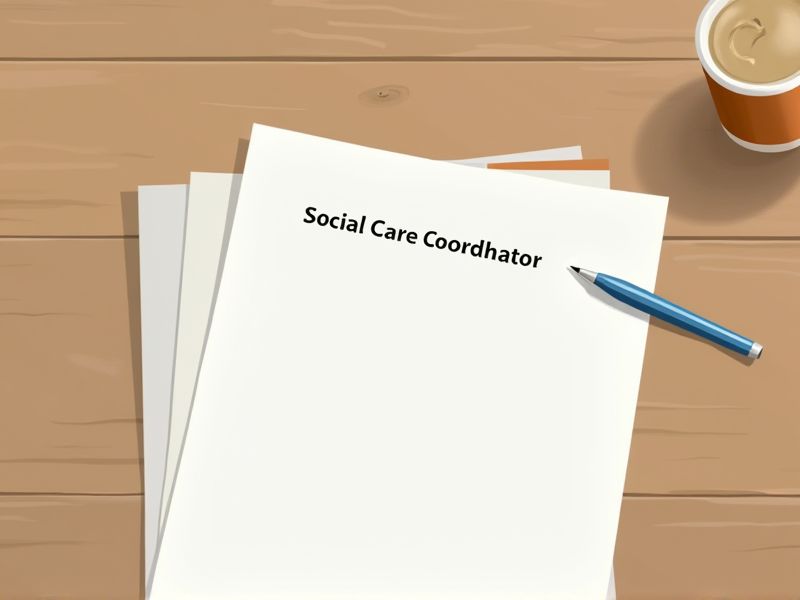
Obtaining specific certifications is crucial for a Social Care Coordinator to ensure they possess the necessary skills to address diverse client needs. Certifications provide structured knowledge and define standards crucial for managing complex social care situations efficiently. They also enhance credibility and trust among clients and peers, reinforcing the coordinator's competence. Here are some important certifications you may need for a Social Care Coordinator role.
Care Certificate
The Care Certificate provides Social Care Coordinators with a standardized baseline of skills and knowledge, which enhances their professional credibility. This structured framework ensures a consistent quality of care across the sector, reducing discrepancies in service delivery. Having a Care Certificate increases confidence among clients and their families, knowing care is delivered by well-trained individuals. Investment in such training leads to improved staff retention, minimizing recruitment challenges faced by care organizations.
Certificate IV in Community Services
Social Care Coordinators benefit from Certificate IV in Community Services as it provides a solid foundation in key areas like case management and client advocacy. This qualification equips them with the necessary skills to effectively assess and support clients with diverse needs. By understanding community services frameworks, coordinators can navigate complex social systems, ensuring more efficient service delivery. Accredited training enhances credibility, often making it a requirement for employment in the sector.
Diploma in Adult Social Care
A Diploma in Adult Social Care equips a Social Care Coordinator with specialized knowledge to effectively manage care plans for diverse adult populations. This qualification provides essential skills in communication and crisis management, crucial for coordinating complex care scenarios. Understanding legal and ethical frameworks ensures coordinators uphold standards, enhancing service quality and compliance. The diploma fosters leadership abilities, which are vital in overseeing support staff and optimizing care delivery.
Mental Health First Aid Certification
Mental Health First Aid Certification equips a Social Care Coordinator with critical skills to identify early signs of mental health issues, improving intervention outcomes. Recognizing symptoms sooner can alleviate chronic conditions, reducing strain on healthcare systems and associated costs. Proper training fosters a safer support environment, enhancing trust between coordinators and those they assist. Certification contributes to professional development, aligning with global standards for mental health care excellence.
Safeguarding Adults Certification
Safeguarding Adults Certification equips Social Care Coordinators with essential knowledge to identify and address signs of abuse and neglect. This certification ensures they adhere to legal and ethical obligations, reducing the risk of harm to vulnerable individuals. With this training, coordinators gain confidence in implementing protection plans and collaborating effectively with multidisciplinary teams. Hence, improving overall quality of care and enhancing safety within the community.
First Aid and CPR Certification
First Aid and CPR certification equips a Social Care Coordinator with vital skills to handle medical emergencies, thereby ensuring the safety and well-being of individuals in their care. This certification enhances their ability to respond promptly in crisis situations, minimizing potential harm to clients. Certification also instills confidence in families and healthcare professionals, fostering trust in the coordinator's ability to manage various scenarios. The training meets regulatory requirements, supporting compliance with health and safety standards in social care settings.
Dementia Care Certification
Social care coordinators with dementia care certification gain specialized knowledge that enhances their ability to manage the unique challenges faced by individuals living with dementia. This certification equips them with evidence-based strategies to improve communication and care practices, which directly impact the quality of life for dementia patients. Having certified professionals in these roles also increases confidence among families and improves the overall trust in care services. In turn, better-trained coordinators contribute to reduced care-related incidents and lessen the burden on the healthcare system.
Manual Handling Certification
Increased knowledge of manual handling techniques helps reduce the risk of injury for both the social care coordinator and the individuals they assist. Compliance with health and safety regulations ensures that the workplace adheres to legal standards, avoiding potential liabilities. Proper training can lead to more efficient care delivery, improving overall work performance and client satisfaction. Having a certified understanding of manual handling fosters a safer work environment, promoting a culture of safety within the care team.
Medication Management Certification
Medication Management Certification ensures Social Care Coordinators are equipped with the necessary knowledge to safely oversee and manage clients' medication regimens. Improper medication management can lead to adverse effects, and certification provides strategies to mitigate such risks. It enhances the coordinators' ability to collaborate with healthcare providers, ensuring accurate medication administration and record-keeping. Certification demonstrates adherence to best practices and regulatory standards, boosting trust with clients and their families.
Leadership and Management in Social Care Certification
Social care coordinators face complex challenges that require both leadership and management skills to guide teams effectively, necessitating specialized training. By equipping coordinators with a Leadership and Management in Social Care Certification, they gain the ability to implement strategic solutions and improve service delivery. This certification also ensures adherence to regulatory standards, mitigating risks associated with non-compliance. Enhancing decision-making skills through structured learning leads to better outcomes for service users and staff alike.
Summary
You will likely find that a Social Care Coordinator with certifications can bring improved quality of care to your organization. These qualifications often lead to more effective communication with clients and team members. Certified coordinators tend to implement best practices and adhere to industry standards, enhancing overall service delivery. This professional development may result in higher client satisfaction and increased trust in care services.
